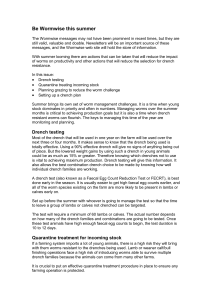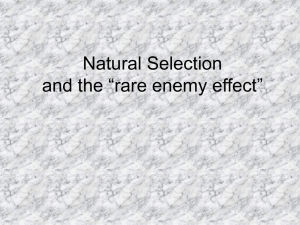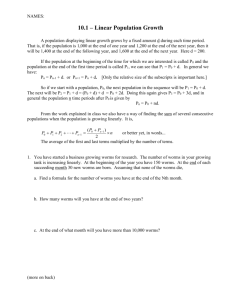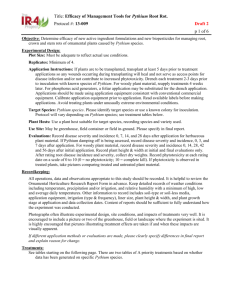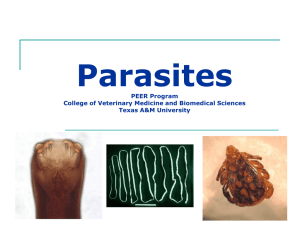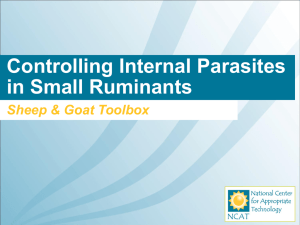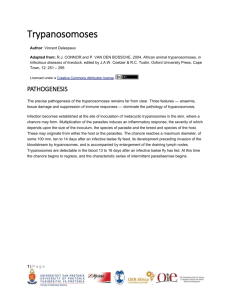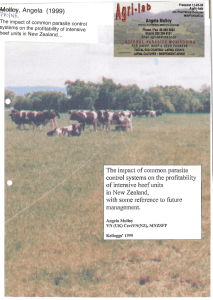Download: printable article lifestyle blocks parasite control
advertisement
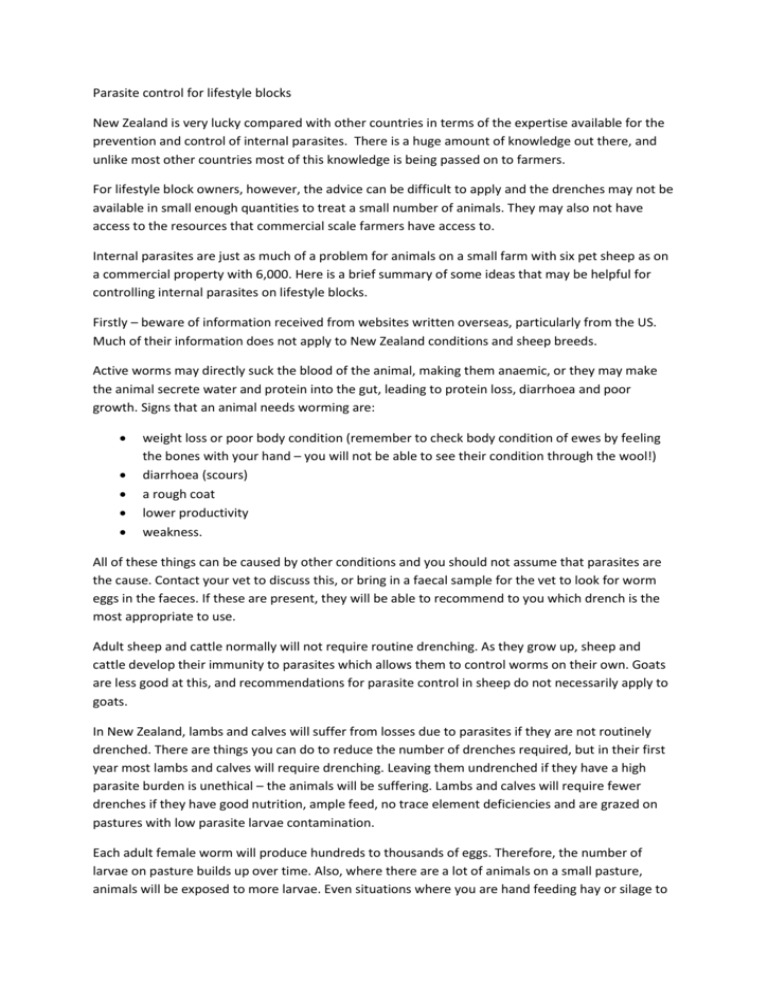
Parasite control for lifestyle blocks New Zealand is very lucky compared with other countries in terms of the expertise available for the prevention and control of internal parasites. There is a huge amount of knowledge out there, and unlike most other countries most of this knowledge is being passed on to farmers. For lifestyle block owners, however, the advice can be difficult to apply and the drenches may not be available in small enough quantities to treat a small number of animals. They may also not have access to the resources that commercial scale farmers have access to. Internal parasites are just as much of a problem for animals on a small farm with six pet sheep as on a commercial property with 6,000. Here is a brief summary of some ideas that may be helpful for controlling internal parasites on lifestyle blocks. Firstly – beware of information received from websites written overseas, particularly from the US. Much of their information does not apply to New Zealand conditions and sheep breeds. Active worms may directly suck the blood of the animal, making them anaemic, or they may make the animal secrete water and protein into the gut, leading to protein loss, diarrhoea and poor growth. Signs that an animal needs worming are: weight loss or poor body condition (remember to check body condition of ewes by feeling the bones with your hand – you will not be able to see their condition through the wool!) diarrhoea (scours) a rough coat lower productivity weakness. All of these things can be caused by other conditions and you should not assume that parasites are the cause. Contact your vet to discuss this, or bring in a faecal sample for the vet to look for worm eggs in the faeces. If these are present, they will be able to recommend to you which drench is the most appropriate to use. Adult sheep and cattle normally will not require routine drenching. As they grow up, sheep and cattle develop their immunity to parasites which allows them to control worms on their own. Goats are less good at this, and recommendations for parasite control in sheep do not necessarily apply to goats. In New Zealand, lambs and calves will suffer from losses due to parasites if they are not routinely drenched. There are things you can do to reduce the number of drenches required, but in their first year most lambs and calves will require drenching. Leaving them undrenched if they have a high parasite burden is unethical – the animals will be suffering. Lambs and calves will require fewer drenches if they have good nutrition, ample feed, no trace element deficiencies and are grazed on pastures with low parasite larvae contamination. Each adult female worm will produce hundreds to thousands of eggs. Therefore, the number of larvae on pasture builds up over time. Also, where there are a lot of animals on a small pasture, animals will be exposed to more larvae. Even situations where you are hand feeding hay or silage to your ewes they may still be getting worms by nibbling short grass on the edges of their paddock. Conversely, where pastures are long and animals are not forced to eat close to the ground they will pick up fewer larvae and generally have less of a worm burden. Many drenches are available, which can be confusing even to experienced farmers. There are five drench families available in New Zealand for killing gastrointestinal internal parasites, three “classic” families and two “novel” families. Most of the drenches available for sheep contain a combination of two or more of the classic families. Many drenches with different brand names contain the same ingredients – drenches from the same families. If you give one drench and it doesn’t work, giving another drench will not work any better unless it contains a drench family that the worms are not resistant to. Most farms in New Zealand have some degree of drench resistance. Without drench testing, you will not know whether resistance is present to one or more drench families. The simplest form of drench testing is to collect ten fresh faecal samples (or one per animal if you have fewer than ten animals!) and bring it into your vet so they can count the worm eggs present. If there are any worm-eggs present ten days after drenching, your sheep or cattle have worms which are resistant to that drench, and you should avoid using it. For people with a small number of animals, there is an additional complication that many drenches are only available in large quantities, suitable for 1,000 lambs but not 10 lambs. Some vet clinics are able to dispense small amounts of some drenches. Otherwise, see if you can get a group of people together to buy a litre of drench and share it between you. As well as routine drenching, the following measures will help prevent parasite burdens from being a problem. These are especially important for the lifestyle block farmer. Do not drench animals which do not require drenching – adult animals, and animals in good body condition should not be drenched. Even if they have worms, they are not suffering from the effects of the worms. When drenching lambs, do not drench more often than every 28 days. Make sure you are giving the correct amount of drench for the animal’s weight. Make sure animals have sufficient feed for their age and type – well fed animals will suffer less from a small worm burden and not require as many drenches. In many areas of New Zealand, soils are deficient in cobalt, copper and/or selenium. Animals which have deficiencies of these elements will suffer more from parasites than animals which do not. Contact your vet to find out whether you need to supplement your animals with trace elements, and what is the best way to do this. Graze lambs with cattle or with healthy adult ewes. These animals have an immune system that prevents worms from establishing and laying eggs, resulting in lower contamination of the pasture with worm larvae. Animals grazing longer grass (higher pastures) pick up fewer worm larvae, as well as having better nutrition which helps prevent parasites from being a problem. In summary, animals in poor body condition particularly with diarrhoea may be suffering from parasites. There are many different drenches available, and without knowing whether parasite resistance to drenches is present on your property we can’t tell you which drench is the right one to use. Adult animals should not need routine preventive drenching, if you are unsure whether your animal is suffering from parasites contact a vet or bring in faecal samples for us to test for parasite eggs. Good nutrition helps animals deal with parasites without needing to be drenched. We are always happy to answer any questions about the health of your animals, or to help you make a parasite control plan that suits your farm.
